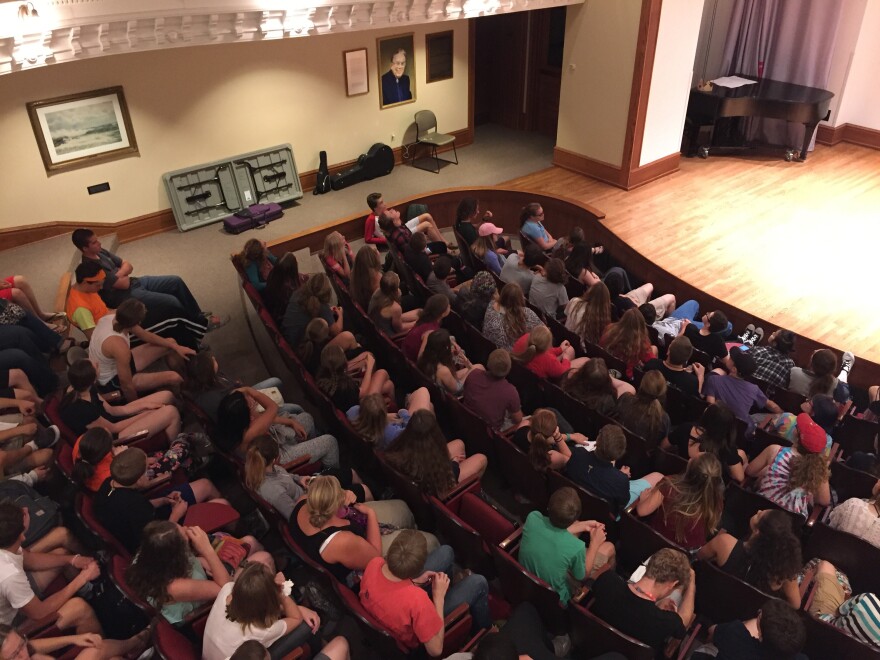South Dakota produces some big thinkers. Take Ernest Lawrence, winner of the 1939 Nobel Prize in Physics, or the artist Oscar Howe, whose work hangs in museums around the world, or even Al Neuharth, founder of the newspaper USA Today.
The South Dakota Governor’s Camp and Ambassadors of Excellence are two programs designed to spur the next generation of big thinkers.
When you think of gathering the top students in the state, in subjects like math, science and art, a show choir performance might not be the first sound that comes to mind. But that's what Ambassadors of Excellence do every year, or at least as one aspect of their experience in Vermillion.
These aren’t all choir or theater students. Rather it’s a diverse mix of young people.
Ambassadors of Excellence take part in days of musical rehearsals alongside classes, seminars and team-building activities. Ambassador Emily Nielson says camp is much more than show choir.
“It’s so refreshing to see other parts they don’t teach you in school and really explore intellectually different aspects of knowledge," says Nielson. "You get to grow and expand so much. In a typical classroom at school, there’s not room to grow, and at camp, growth is so encouraged, and that’s the real difference,” says Nielson.
This camp is for young people who are considered gifted. The National Association for Gifted Children recognizes students who excel in academics, fine arts or leadership. The NAGC says gifted kids have many interests rather than a single focus.

Camper Rebecca Jones explains what it’s like to be gifted by using a set of plastic cups and water.
“Gifted kids think a little bit differently. They may like a little bit of something a doctor does, they may like a little bit of something a teacher does, they may apply their skills to be an artist, they may apply their skills to be something else… You see, it’s kind of split up between a few different cups, but it doesn’t quite fill those cups completely," says Jones.
The camp has supported learners who pour their knowledge into multiple cups since 1984. Camp director Heath Weber says the program originally helped teachers earn gifted certification. He says all school districts received federal gifted funding at the time, requiring teachers and curricula tailored to high ability students. Weber says the camp struggled when South Dakota eliminated its gifted education budget. But he says the camp’s impact on the state’s brightest students keeps the desire for gifted funding alive.
“At some point, someone is going to have to stand up and say ‘we need to do this,’ and someone’s going to have to fight for that. The kids are really passionate about their education, and I loved my time as a gifted student in South Dakota because I had that full mandate," says Weber. "Because it’s been so long since anyone’s really known what that is like, no one really understands what it could be.”

Some teachers and legislators disagree on how to prioritize gifted education funding. Christine Griebel is a teacher in Sioux Falls. She says gifted education needs support from state lawmakers. She compares gifted education funding to special education programs.
“We serve students in special education with federal funds, but we don’t serve children at the other end of the spectrum under the same circumstances, and I think the common misconception is that they’ll be okay, but we need to end that," says Griebel.
Today only some districts with enough funding have gifted programs. Timothy Johns is the vice-chair of the state House of Representatives' Education committee. He says leaving gifted education as a local decision is best for the state’s budget. He says the state and larger districts shouldn’t have to fund programs for districts choosing to stay small.
“A lot of those issues are generally addressed by your local school board; they’re the ones that make those decisions as to the programming. If you make a choice, then there’s ramifications. It gets to be a matter of priorities of how you’re going to allocate moneys. You only have so much state money, period, and it never goes far enough the way it is," says Johns.
More and more students are pursuing opportunities outside South Dakota. Laurie Wenger directs advanced programs in Harrisburg. She says gifted programming helps all students reach their fullest potential. She doesn’t see gifted education as elitism. She says it benefits the entire state.
“Overall, any child in South Dakota, whether they be an ELL student, a special ed student, a regular ed student or an advanced student, if they don’t maximize their potential, we all lose," says Wenger. "Ideally as we look more at the needs of all students and personalizing learning to fit the needs of all kids in our school systems, we won’t ignore this group."
Back on the University of South Dakota campus, the Ambassadors of Excellence are performing the show that is the finale of their two-week long program. Tears roll down many of the kids’ faces as they prepare to return to their hometowns.

USD’s summer gifted programs have continued for decades despite funding cutbacks. The goal remains the same – that the students in these programs can grow into South Dakota’s future big thinkers.

